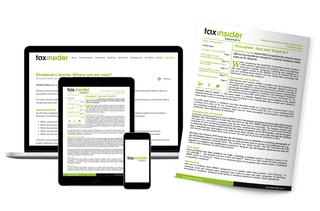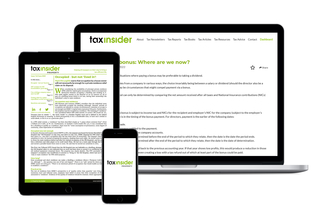Property Tax Insider Monthly Newsletter
Subscribe to our monthly property tax newsletter and tax article library and receive news, tips and strategies guaranteed to minimise your property tax bill
 DIGITAL & PRINT
DIGITAL & PRINT
- 14 day free trial
- Up to date monthly tax saving tips
- New tax strategies added every month (48 over the year)
- No minimum tie-ins, cancel anytime
Property Tax Insider subscription benefits
We recently asked our subscribers what they love about Property Tax Insider.
These are the top 7 reasons that they gave us:
-
Guaranteed ROI After 90 days, if you've not saved money on your tax bill we'll give you a prompt refund
-
Proactive We bring relevant, actionable tax saving opportunities directly to you
-
Time saving Don't waste your precious time searching for answers to tax questions on the Internet
-
Powerful Use our data, articles and information to take control of your finances
-
Safe Keep up to date, so you don't get caught out by new rules and regulations
-
Simplifying Our publications simplify complex tax rules into easily digestible, actionable points
-
Balanced We help you find a balance between saving money versus ethical & legal compliance
Here are just some of the strategies our tax experts are sharing with subscribers this month
-
Transferring property: ‘Dos’ and ‘don’ts’
If done right, there are very significant tax savings to be made by transferring property. However there are a number useful tax pointers to consider in contemplation of property transfers.
Lee Sharpe considers some key tax aspects of property transfers. -
Demolishing a property: What are the tax implications?
Every building has a life span - usually between 80 and 100 years. Older buildings require a considerable amount of maintenance, and there comes a point when repairs are not always cost-effective.
Jennifer Adams considers the tax implications of demolishing a residential property and rebuilding from scratch rather than just renovating.
-
Residential property gains: Tax and reporting
For capital gains tax (CGT) purposes, all gains are not equal. Higher rates of tax apply where the gain relates to residential property. There are also stricter reporting and payment deadlines.
Sarah Bradford examines the impact of the reduction in the higher rate of capital gains tax on residential property gains and the rules for reporting the gain and paying the tax.
-
POAT and property: Don’t get caught!
'Pre-owned assets tax’ (POAT) is an income tax charge (FA 2004, Sch 15), which was originally introduced to block certain inheritance tax (IHT) anti-avoidance arrangements. However, it can have unintended and unfortunate consequences in some cases.
Mark McLaughlin looks at pre-owned assets tax and the ‘occupation’ of land and buildings.
-
Q&As with Arthur Weller
Property Tax Insider articles from April 2024
-
Form 17: Tips and traps
There are complications to the Form 17 procedure for married couples and civil partnerships. The regime applies only to legally married couples and civil partnerships, where the spouses, etc., are living together as a couple during the tax year (ITA 2007, ss 836, 837).
Lee Sharpe looks at some of the intricacies of Form 17 for spouses and civil partners.
-
Extracting profits from a property company
Changes in the ways that unincorporated landlords receive relief for interest costs in relation to residential lettings have led to an increase in corporate landlords. There are some tax advantages: interest and finance costs incurred in relation to residential lets are deductible in full in computing the property company’s profits for corporation tax purposes; and the highest rate of corporation tax at 25% is significantly lower than the highest rate of income tax at 45%.
Sarah Bradford explores how profits can be extracted from a property company for personal use in a tax-efficient manner. -
Ten years on: Has the let property campaign had its day?
Think back to 2013; David Cameron was still Prime Minister, HMV had collapsed, Andy Murray won Wimbledon, and HMRC announced the start of the let property campaign (LPC).
Jennifer Adams considers whether the ‘Let property campaign’ has been a success for HMRC and asks whether it will still be around ten years from now.
-
Deduction of costs for CGT on disposal of investment property
For capital gains tax (CGT) purposes, in determining a gain (or loss) when an individual disposes of an asset such as a buy-to-let investment property, certain incidental costs can normally be deducted in calculating the taxable gain (or allowable loss), in addition to the cost of acquiring the property.
Mark McLaughlin looks at the deduction of costs for capital gains tax purposes on the disposal of an investment property by an individual.
-
Q&As with Arthur Weller
Property Tax Insider articles from March 2024
-
When tax can be taxing! Property partnerships and CGT
The theory behind partnership taxation is logical and relatively straightforward. But partnerships themselves can be quite complex and mutable animals, so those initially simple rules sometimes become quite contorted as new partners join, others leave and sharing ratios change over time.
Lee Sharpe looks at the special rules for property assets within a partnership.
-
Legal or beneficial ownership: It matters!
In most cases, assets are legally and beneficially owned by the same person (NB this article considers the law in England, Wales, and Northern Ireland). However, this is not always the case.
Mark McLaughlin looks at the distinction between assets which are legally or beneficially owned, and the implications for capital gains tax purposes.
-
‘Mates rates’: Tax implications for landlords
Not all landlords let property to make a profit, be that an income profit or capital gain. There are various circumstances in which a landlord may let at a rate below the current market rate (termed an 'uncommercial' rent) where, for example, a landlord who has otherwise empty properties rents to family and friends at a low rent or even rent-free. The definition of an ‘uncommercial’ let is a property rented for less than the market rate of a comparable property in the neighbourhood.
Jennifer Adams considers the tax implications for landlords when renting out a property at a reduced rent or rent-free.
-
Property allowance: When is it available?
The property allowance is something of an easement in that it removes the need for individuals to report small amounts of income from property – and saves HMRC from having to collect small amounts of tax where the costs of collection outweigh the tax collected.
Sarah Bradford explains the nature of the property allowance and explores the limitations on its use. -
Q&As with Arthur Weller
 DIGITAL & PRINT
DIGITAL & PRINT
- 14 day free trial
- Up to date monthly tax saving tips
- New tax strategies added every month (48 over the year)
- No minimum tie-ins, cancel anytime
OR, if you are ready to save money on your tax bill...
 DIGITAL & PRINT
DIGITAL & PRINT
- 14 day free trial
- Up to date monthly tax saving tips
- New tax strategies added every month (48 over the year)
- No minimum tie-ins, cancel anytime




